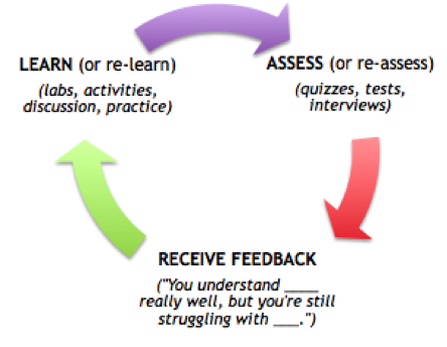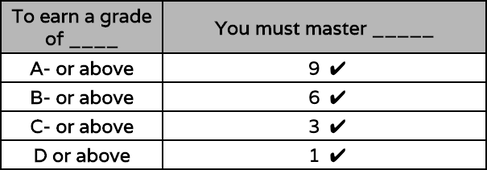A - Represents outstanding distinction and excellence. Demonstrates superior understanding which far exceeds the basic material. (90 - 100%)
- These are not impossible to achieve but are rare and difficult to come by. While there is merit to hard work and long hours, it does not always guarantee success. Excellence refers to the combined results not just the effort.
- An above average understanding of this challenging material is something to be very proud of! Look at what you have done well to earn this accomplishment. Look back at what you did well and try to build and grow.
- While average is not usually an appealing rank, you have demonstrated a mastery of the truly important concepts and to artists who strive for extraordinary and unique. C is however a very respectable point. Recognize what more is needed; plan to move ahead, improve and grow.
- Perhaps priorities about school have not been established. Recognize however, that a D can also mean that you truly do not understand what is expected. You should make trip to see me in extra help immediately to discuss how you might take action on your future and upcoming assignments.
- It represents lack of effort/interest. It is a cause for deep concern.
This year, you will be asked to think critically and solve unfamiliar problems in different ways. You may find this very challenging and THAT'S OK!! That means your brain is growing and your are learning to become a critical thinker!
Your grade this year will be divided into two parts:
1. Assessments: Understanding of Physics Content (85%)– this is the majority grade
2. Labs (6%)
3. Homework (6%)
4. Projects (3%)
Your grade this year will be divided into two parts:
1. Assessments: Understanding of Physics Content (85%)– this is the majority grade
2. Labs (6%)
3. Homework (6%)
4. Projects (3%)

The Assessment Cycle
In the traditional grading system, you are marked for what percentage of the points you earn. In this system a grade, like a 70%, gives you no feedback about what topics/concepts you are struggling with. Failing a quiz can significantly hurt your grade, even if you go back, study hard, and master all of the material for the test.
The content area of your grade is based on a method of assessment called Standards-Based Grading. The goal of this method is to give you specific feedback to help you grow, learn, and understand the material of the course. It recognizes learning is a continual process and allows you to fail on first attempts, because this is how we learn and make improvements.
In this system, you will learn material and then be assessed on what you know. If you are struggling you have the opportunity to go back and learn/re-learn the material before the next assessment. Your grades are assessed by specific topics (learning targets), which will continue to update as you are assessed to show a picture of your progress instead of a number based on points.
In the traditional grading system, you are marked for what percentage of the points you earn. In this system a grade, like a 70%, gives you no feedback about what topics/concepts you are struggling with. Failing a quiz can significantly hurt your grade, even if you go back, study hard, and master all of the material for the test.
The content area of your grade is based on a method of assessment called Standards-Based Grading. The goal of this method is to give you specific feedback to help you grow, learn, and understand the material of the course. It recognizes learning is a continual process and allows you to fail on first attempts, because this is how we learn and make improvements.
In this system, you will learn material and then be assessed on what you know. If you are struggling you have the opportunity to go back and learn/re-learn the material before the next assessment. Your grades are assessed by specific topics (learning targets), which will continue to update as you are assessed to show a picture of your progress instead of a number based on points.
Your Progress on Each Learning Target
After an assessment, your teacher will indicate your progress on each topic using a ✔ or ✘ to indicate your understanding of the topic. The goal is to make it very simple to glance at the feedback and clearly see what you DO and DON'T understand.
After an assessment, your teacher will indicate your progress on each topic using a ✔ or ✘ to indicate your understanding of the topic. The goal is to make it very simple to glance at the feedback and clearly see what you DO and DON'T understand.
While this binary system is simple, it is useful to know how close you are to mastering a particular target. For this reason we offer additional feedback using the following rubric.
Checkpoints/Quizzes
Sometimes the term "quiz" can make students unnecessarily anxious. In this class, quizzes are an opportunity for me to give you feedback about what you do, and do not, know. It is also let's me know what areas you are struggling with. So instead of thinking of these assessment tools as "quizzes" think of them as "checkpoints" on your way towards understanding. Checkpoints help you monitor your understanding of the material and inform you about areas in need of improvement. There will be several Checkpoints during each unit of study. In order to do well, it is critical that you understand the concepts and methods practiced by doing the homework.
Checkpoints will be graded for evidence of mastery of the material. Therefore, credit is only awarded if you show clear evidence of understanding. For this reason, it is important to show all of your work and explain your thinking as much as possible. In order to demonstrate how your understanding has improved over time, there will be opportunities to retake these Checkpoints/quizzes.
In this class, you will often be assessed without warning. These "POP" Checkpoints/Quizzes are meant to help ease anxiety about assessments in a low-risk scenario to help you prepare for any anxiety before a test. They will also give you very honest feedback on your inherent understanding of a concept without studying.
Sometimes the term "quiz" can make students unnecessarily anxious. In this class, quizzes are an opportunity for me to give you feedback about what you do, and do not, know. It is also let's me know what areas you are struggling with. So instead of thinking of these assessment tools as "quizzes" think of them as "checkpoints" on your way towards understanding. Checkpoints help you monitor your understanding of the material and inform you about areas in need of improvement. There will be several Checkpoints during each unit of study. In order to do well, it is critical that you understand the concepts and methods practiced by doing the homework.
Checkpoints will be graded for evidence of mastery of the material. Therefore, credit is only awarded if you show clear evidence of understanding. For this reason, it is important to show all of your work and explain your thinking as much as possible. In order to demonstrate how your understanding has improved over time, there will be opportunities to retake these Checkpoints/quizzes.
In this class, you will often be assessed without warning. These "POP" Checkpoints/Quizzes are meant to help ease anxiety about assessments in a low-risk scenario to help you prepare for any anxiety before a test. They will also give you very honest feedback on your inherent understanding of a concept without studying.
Re-Assessing Learning Targets
Your demonstration of understanding on each learning target can go up or down as new feedback is collected. If your new score is higher, I will keep the new score. If your new score is lower, I will keep the new score. Your teacher will re-assess learning targets in class. You do not need to ask to be re-assessed
Your demonstration of understanding on each learning target can go up or down as new feedback is collected. If your new score is higher, I will keep the new score. If your new score is lower, I will keep the new score. Your teacher will re-assess learning targets in class. You do not need to ask to be re-assessed
Tests
You are expected to have mastered each learning targets by the time of the unit test. If you have already demonstrated mastery on the two most recent assessments of a learning target, then you are exempt from testing on that learning target (this is a ✔+) . In this case, you must speak with your teacher before test day to obtain a list of exemptions for the test.
You are expected to have mastered each learning targets by the time of the unit test. If you have already demonstrated mastery on the two most recent assessments of a learning target, then you are exempt from testing on that learning target (this is a ✔+) . In this case, you must speak with your teacher before test day to obtain a list of exemptions for the test.
The process for re-taking a test is different from re-taking an OFF. In order to re-take a test or a portion of a test, you must submit an application which will include test corrections, reinforcement practice, and a practice quiz. You can get a copy of the application from your teacher or from the class website.
Note: while you are preparing for the re-take, you are also responsible for keeping up with current class material.
If your test shows that you have a developing or beginning level of mastery on less than 20% of the learning targets, then, you are required to attend an interview with your teacher and begin a plan for retaking the test.
Note: while you are preparing for the re-take, you are also responsible for keeping up with current class material.
If your test shows that you have a developing or beginning level of mastery on less than 20% of the learning targets, then, you are required to attend an interview with your teacher and begin a plan for retaking the test.
Levels of Targets and Numerical Grades
Each learning target is categorized as Core, Intermediate, or Advanced.
If you would like your grade to increase, you must master more learning targets.
Each learning target is categorized as Core, Intermediate, or Advanced.
- Core (A) skills are the most fundamental and are essential to master because future concepts will continue to build on them.
- Intermediate (B) skills contain the remainder of the basic Physics curriculum.
- Advanced (C) targets show the depth of your understanding by asking you to apply the physics concepts to new situations beyond what we may have discussed in class.
If you would like your grade to increase, you must master more learning targets.
This portion of your grade will reflect how you perform scientific skills like communicating, collaborating, carrying out investigations, and analyzing/interpreting data. Assignments to assess these skills may include lab reports, lab practicals, projects, or presentations.
Labs are a vital part of this course. If you do not make up a missed lab activity within two days of the original date, you may use your partners’ data, but will lose 25% of the total available points for the lab. You can schedule make-up labs with your teacher. It is often best if students who miss a lab on the same day can make up the lab together.
For late lab reports, you have 5 days (this includes weekends) to submit your assignment for partial credit. Each day, your project will lose 10% of the maximum value. A homework is considered late if it is turned in one minute after the deadline.
Labs are a vital part of this course. If you do not make up a missed lab activity within two days of the original date, you may use your partners’ data, but will lose 25% of the total available points for the lab. You can schedule make-up labs with your teacher. It is often best if students who miss a lab on the same day can make up the lab together.
For late lab reports, you have 5 days (this includes weekends) to submit your assignment for partial credit. Each day, your project will lose 10% of the maximum value. A homework is considered late if it is turned in one minute after the deadline.
3. Homework
Homework will be calculated and count towards 6% of your quarter grade. Homework will be submitted either online via WebAssign (www.webassign.net), on paper in class, or on the Google Classroom (for written assignments). However, it will ALWAYS be posted on the Husky Hub Assignment Center. This is the official place to find due dates for each assignment homework is always due at the beginning of the class period.
Most homework assignments will be checked the day they are due. Graded assignments, like WebAssigns, will be broken in two parts. 25% of their grade will be based on their correctness on the due date, the other 75% will be based on their correctness after the revision period. Graded homework assignments can be revised from the time they are assigned until the day of the unit test.
For other assignments which are checked for completion, you will receive full credit if your homework is completed on time and shows evidence of reasonable effort. Evidence of reasonable effort means that if you could not complete the assignment, you showed all of the work that you could complete, and you wrote sentences or questions that make it clear where you were confused. Attending extra help to go over the homework is also evidence of reasonable effort.
Most homework assignments will be checked the day they are due. Graded assignments, like WebAssigns, will be broken in two parts. 25% of their grade will be based on their correctness on the due date, the other 75% will be based on their correctness after the revision period. Graded homework assignments can be revised from the time they are assigned until the day of the unit test.
For other assignments which are checked for completion, you will receive full credit if your homework is completed on time and shows evidence of reasonable effort. Evidence of reasonable effort means that if you could not complete the assignment, you showed all of the work that you could complete, and you wrote sentences or questions that make it clear where you were confused. Attending extra help to go over the homework is also evidence of reasonable effort.
4. Projects
Each quarter will have one capstone project to apply knowledge acquired throughout the quarter. This may be in the form of a lab, engineering project, or other method. This project will be ~3% of the quarter grade.




